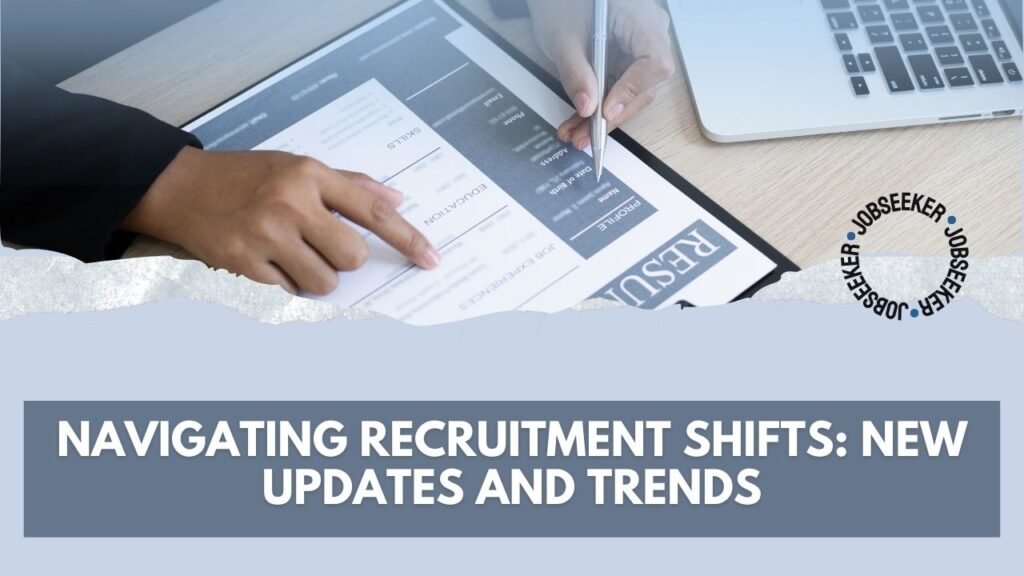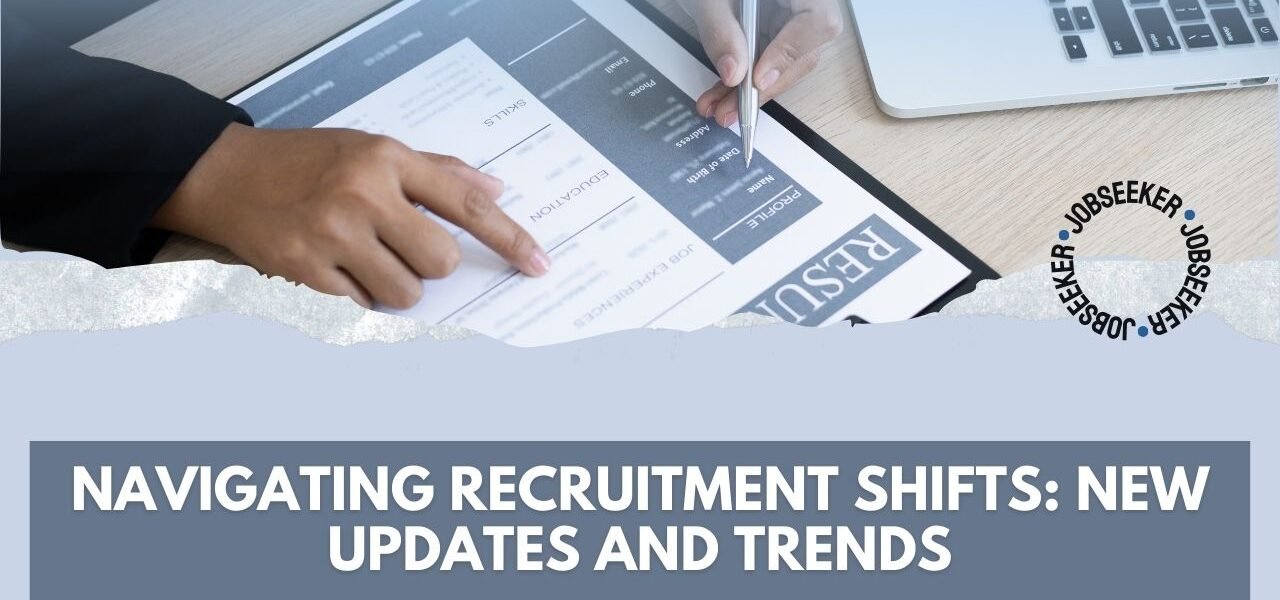Recruitment is constantly evolving. New trends are emerging, and both employers and job seekers must keep up. The job market is experiencing significant recruitment shifts that impact hiring processes, work environments, and talent acquisition strategies.
In this blog, we’ll explore the latest recruitment shifts and how they are shaping the job market. Whether you’re an employer or a job seeker, understanding these trends can help you navigate the changes more effectively.

Remote Work is Here to Stay
One of the most notable recruitment shifts is the rise of remote work. The global pandemic accelerated this trend, but it’s now clear that remote work is a permanent part of many industries.
Employers have discovered the benefits of hiring remote talent. It opens up access to a broader talent pool, allowing companies to recruit from different regions and even countries. Remote work also saves costs on office space and utilities.
For job seekers, remote work offers flexibility. More candidates are prioritizing roles that allow them to work from home. This recruitment shift is driving companies to adapt by offering hybrid and fully remote positions to attract top talent.
Emphasis on Diversity and Inclusion
Diversity and inclusion (D&I) remain a crucial part of recruitment shifts. Companies are increasingly focused on building diverse teams that reflect different backgrounds, experiences, and perspectives.
To remove bias from the recruitment process, many companies are implementing D&I strategies. Blind recruitment, where personal information like names and photos are removed from resumes, is becoming more common. Diverse hiring panels are also being used to ensure a fair selection process.
Job seekers, especially those from underrepresented groups, are paying attention to a company’s commitment to diversity. Employers that embrace this recruitment shift are more likely to attract diverse, talented individuals who value inclusion in the workplace.
Technology and AI in Recruitment
The use of technology and AI is one of the most significant recruitment shifts in recent years. Automated systems are being used to streamline hiring processes. AI-powered platforms can quickly analyze resumes, match candidates to job openings, and even conduct interviews.
Virtual interviews, online assessments, and AI-driven chatbots are becoming standard in recruitment. This recruitment shift allows companies to save time and resources while improving the candidate experience.
For job seekers, adapting to virtual hiring processes is essential. Familiarity with video interview platforms and online tests can give candidates a competitive edge. Understanding how AI is influencing recruitment is key to navigating this changing landscape.
Skills-Based Hiring on the Rise
Skills-based hiring is a growing trend and a key recruitment shift. Employers are increasingly focusing on candidates’ skills rather than their formal education or degrees. In industries like tech, marketing, and creative fields, practical experience is often valued more than academic qualifications.
Companies are using skills assessments, project-based tasks, and portfolios to evaluate candidates. This shift allows employers to find candidates who have the specific abilities needed for the role.
For job seekers, this recruitment shift means showcasing skills through hands-on experience, certifications, or portfolios is more important than ever. Continuous learning and upskilling are also crucial to staying competitive in the evolving job market.
Candidate Experience is a Priority
One of the major recruitment shifts is the growing focus on candidate experience. Employers are putting more effort into creating a positive, engaging recruitment process. This includes clear communication, timely updates, and a smooth interview process.
Candidates now expect a seamless hiring journey. A positive experience can influence whether a candidate accepts a job offer or recommends the company to others. Companies that prioritize candidate experience are more likely to attract and retain top talent.
For job seekers, a good candidate experience reflects a company’s values and culture. It’s important to choose employers who respect and value their candidates throughout the recruitment process.
Employer Branding Matters More
Employer branding has always been important, but it’s now a key recruitment shift. Companies with strong employer brands are more successful in attracting and retaining talent. In today’s competitive job market, candidates are looking for companies that align with their values and offer a positive work environment.
Employers are investing in showcasing their culture, benefits, and employee experiences on platforms like LinkedIn and Glassdoor. Highlighting a company’s commitment to diversity, work-life balance, and employee wellbeing helps attract top candidates.
For job seekers, researching a company’s employer brand can provide insights into what it’s like to work there. A strong employer brand can help candidates make informed decisions when choosing a new job.
Freelancing and Gig Work
Another notable recruitment shift is the rise of freelancing and gig work. Many professionals are opting for freelance roles instead of traditional full-time positions. The gig economy allows workers to take control of their schedules and work on diverse projects.
For employers, hiring freelancers provides flexibility. Companies can bring in specialized skills for short-term projects without committing to long-term employment contracts.
Job seekers interested in freelancing should focus on building a strong portfolio. Freelancers with proven expertise in their field are highly sought after, making this recruitment shift an attractive option for those looking for more control over their careers.
Mental Health and Wellbeing
Mental health and wellbeing have become top priorities in recruitment. This is one of the most important recruitment shifts affecting both employers and job seekers. Companies are increasingly offering wellness programs, mental health support, and flexible work arrangements to create a supportive environment for their employees.
Job seekers are now placing a higher value on mental health benefits when choosing an employer. A company’s commitment to employee wellbeing can make a significant difference in job satisfaction and productivity.
Employers that embrace this recruitment shift will be more successful in attracting and retaining motivated, healthy employees.
The Need for Lifelong Learning
With industries evolving at a fast pace, lifelong learning has become a key part of recruitment. Upskilling and reskilling are essential for staying competitive in today’s job market. This recruitment shift emphasizes the importance of continuous education for both employers and job seekers.
Companies are offering training programs and encouraging employees to develop new skills. For job seekers, taking courses, earning certifications, or learning new technologies is crucial for career growth.
This recruitment shift highlights the importance of adaptability and learning in a rapidly changing job landscape.
Conclusion
The recruitment landscape is constantly changing. From the rise of remote work to the focus on diversity, technology, and wellbeing, these recruitment shifts are shaping the future of hiring.
Employers must adapt to these trends to stay competitive, while job seekers need to stay informed about the latest developments in recruitment. By understanding these recruitment shifts, both employers and candidates can navigate the evolving job market with confidence.





